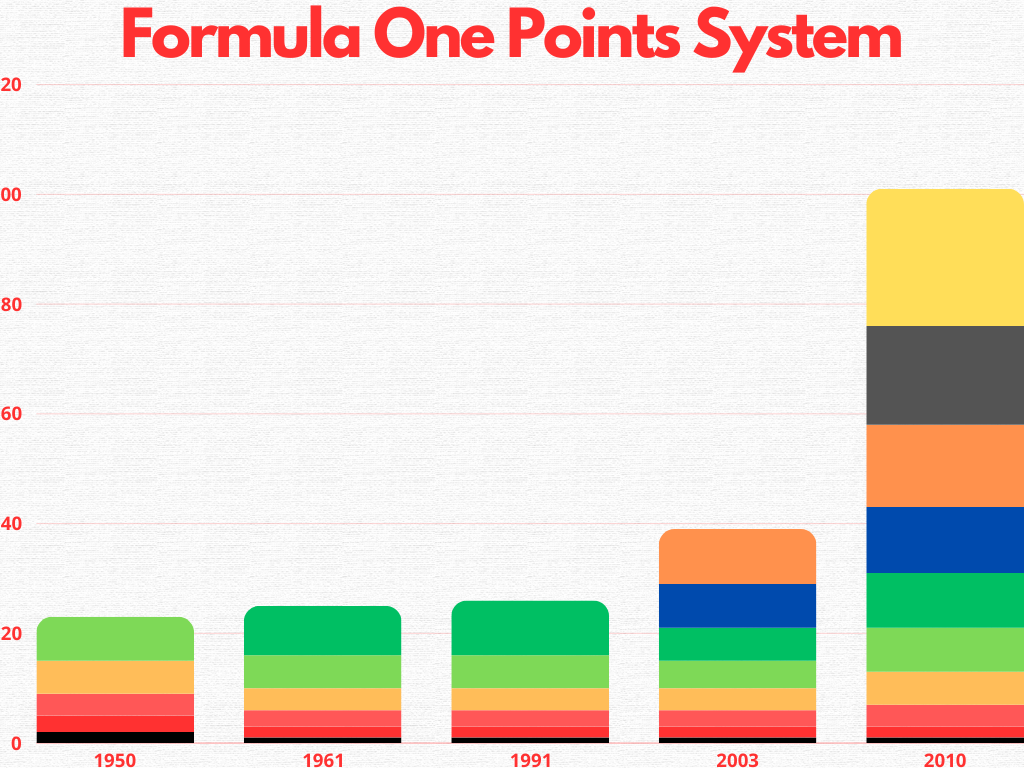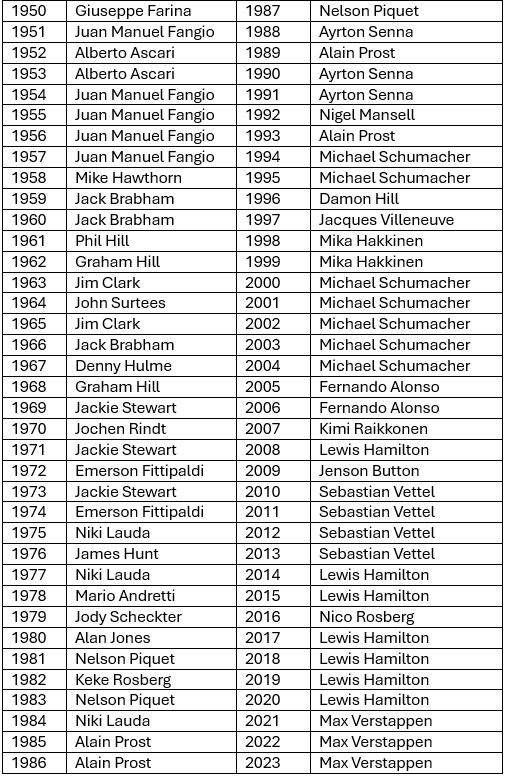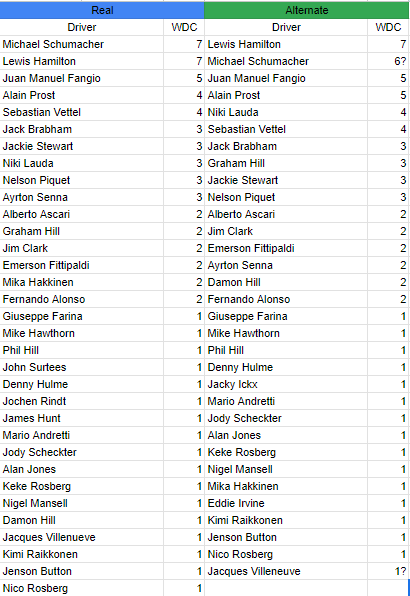Since its inaugural season in 1950, Formula One has gone through revolutionary changes over decades to make it the sport it is today.
From looking very much like tin cans on wheels, with engines at the front of the car, no on-track data for teams to relay to their drivers and little to no regard for driver, mechanic or spectator safety with hundreds of fatalities, F1 looks worlds apart in 2024 from when it started out in 1950.
Today’s cars have a much-improved standard of safety, with front and rear wings and a huge emphasis on downforce and aerodynamics to achieve top speeds of up to 220mph.
Along with the huge technological changes, F1 has also used a variety of different points systems, which have a profound effect on race strategies and world championship battles, particularly if it goes down to the final race of the season.
The current points system is the most expansive in the sport’s history, with 102 points up for grabs at every race, whereas in 1950, only 24 were available per Grand Prix.
This has prompted many to ask the question: what would the previous world championships look like if the points system of today was used throughout the 74 years of F1? When you analyse the data and look at the conversions, it has a drastic effect of several championship results.
The history of the Formula One points system
Before looking at the numbers and making the conversions to the current point system, it is important to understand how points were distributed over the years and how said data has been created.
In the 1950 season, only the top five drivers scored points. Eight points were awarded to the winner, six points for second, four for third, three for fourth and two for fifth. There was also a point awarded to the driver who set the fastest lap of the race, regardless of where or if they finished the event.

In 1960, this extra point for fastest lap was scrapped and the following year, the solitary point would be given to the driver that finished in sixth place and the race winner was awarded nine points.

This system would remain in place all the way until 1991, when the winner of the Grand Prix was then awarded ten points, before in 2003, the top eight drivers of a race would be awarded points, running on a 10-8-6-5-4-3-2-1 basis.
In 2010, the sport would see it’s biggest change to the points scoring system, with the top ten now being able to score and 25 points would be awarded to the winner, descending in an 18-15-12-10-8-6-4-2-1 order. In 2019, the extra point for the fastest lap of the race returned, but it can only be awarded to a driver that finishes within the top ten.
Furthermore, as well as the dramatic changes to points, up until 1991, only a select few race results were actually counted towards the championship.
For example, in 1950, only the drivers’ best four results were counted. In 1961, the best five results were registered and from the late 1960s all the way through the 1980s, different variations of the ‘best results rule’ were used as the amount of races increased (as a random example, in the 1973 season, the best 13 results counted – seven from the first eight races of the season and six from the last seven).
The data used in this analysis has simply converted the points scored in each championship to the current system used from 2019 onwards and as is the case in modern day F1, all race results have been taken into account, rather than a select few as seen in previous world titles.
The results
Immediately, there are some noticeable changes when the current points system is applied to previous points tallies, in that, unsurprisingly, drivers score considerably more and more drivers are added to the final standings for finishing in the top ten and achieving the fastest lap.
In the first season of F1 in 1950, Giuseppe Farina won the world championship with 30 points, finishing three ahead of arch-rival and four-time champion Juan Manuel Fangio. With the conversion being made to the current system and all race results counting, Farina scores 96 points and wins the championship by nine points, but this time over Luigi Fagioli, with Fangio now finishing third.

There is no difference as far as the world champion is concerned for the first 14 seasons, with the only changes being larger points tallies for the most successful drivers and more drivers scoring, most notably in 1952, where a staggering 49 drivers would have been awarded points under the current system.
Finally, in 1964, the first change to the world championship happens, as Graham Hill snatches John Surtees’ first and only title under the new system to win his now second world championship and third overall by six points. Hill had scored more points than Surtees across the season, but as aforementioned, as only a certain amount of results were counted towards the final standings, Surtees claimed the win by just one point.
Surtees is not the only one to lose his championship under the new system, as Jochen Rindt and James Hunt also lose their titles. Rindt had dominated the first half of the 1970 season until he tragically lost his life at the Italian Grand Prix, but he had amassed enough points over Jacky Ickx to become the first and to date only posthumous world champion. Under the new system, Ickx catches Rindt’s tally and becomes a world champion instead.
In 1976, Hunt and arch-rival Niki Lauda had a tense battle for the title, where Lauda seemed to be in control until his near-fatal crash at the German Grand Prix, allowing Hunt to catch up. Lauda returned after missing two races, but after voluntarily retiring in Japan, Hunt won the title by one point. But miracles do indeed happen as Lauda makes an incredible comeback to win his second championship with the current system by three points, which would then lead to him grabbing three consecutive titles and later a fourth in 1984.
Interestingly, only three more championships have a different winner with the current points system; Alain Prost wins the 1988 season over rival and team-mate Ayrton Senna (he scored more points than Senna but again lost out due to not every result counting that year), Michael Schumacher’s disqualification from two races and bans from two others in 1994 come back to bite him as Damon Hill wins the title instead by 15 points and Eddie Irvine becomes a new world champion as he takes away Mika Hakkinen’s second title in 1999 by 17 points.

There is actually a fourth title that is affected by the change in points system, as in 1997, Schumacher wins the title over Jacques Villeneuve by six points. In the season, the German lost the title to the Canadian by three points, but he was disqualified from the championship after he deliberately collided with Villeneuve at the final race of the season. While he scores more points in the new system, his disqualification means Villeneuve keeps his title, but it is certainly up for debate.
Conclusion
When the points systems are converted to the current one for all seasons, it is interesting to see the results that are thrown up from it, with every race counting and the top ten now scoring points creating a much broader championship with more points scorers and significantly higher tallies, as consistency is rewarded rather than being limited to just the best results from a certain number of races.
John Surtees, Jochen Rindt and James Hunt all lose their titles – as well as Villeneuve if one was to ignore Schumacher’s disqualification – and Jacky Ickx and Eddie Irvine become new world champions. Graham Hill, Lauda and Prost all gain a title, while Senna, Schumacher and Hakkinen lose one.
This change also throws up several permutations across different seasons and it is interesting to see whether dramatic events across the races would effect the outcome of the season; a prime example being 2008. Lewis Hamilton passed Timo Glock on the final corner of the last lap of the last race of the season to beat Felipe Massa, who had won the race and looked like he would win the championship, by just one point. Incredibly, under the new system, with Massa clinching the fastest lap point, that title-deciding moment for Hamilton still happens and he wins again by one point.
With this data, it is clear to see that the expansive system for handing out points at Formula One races has a profound effect on world championships, with consistency giving drivers a huge boost for their title chances and greater rewards for race victories creates a more dominant championship, has evidenced by the conversions made to previous years.

